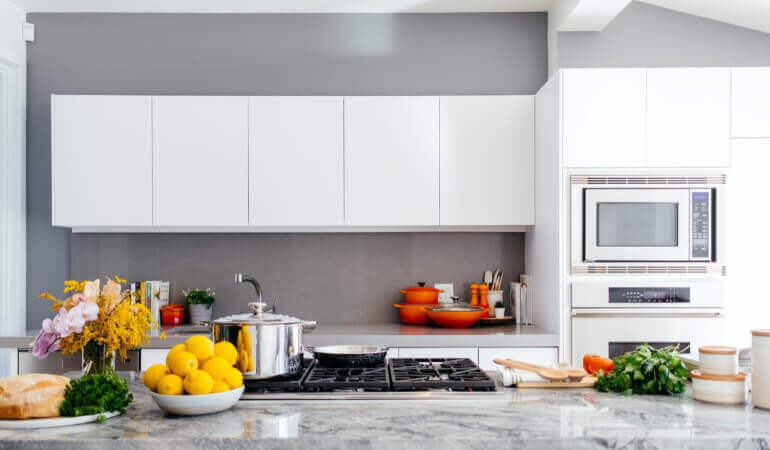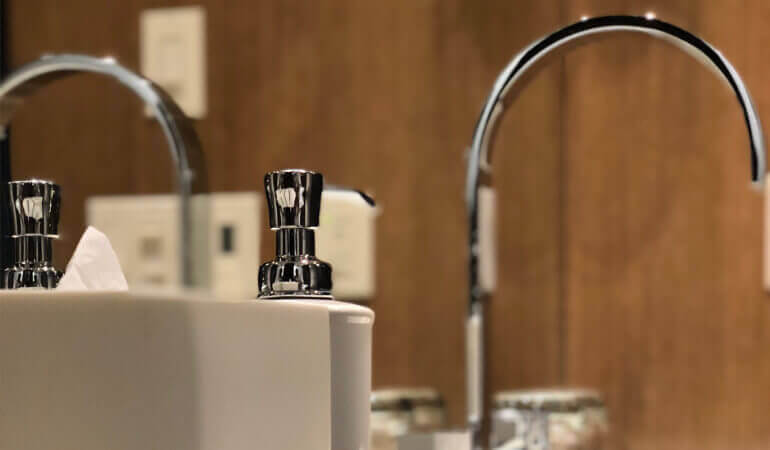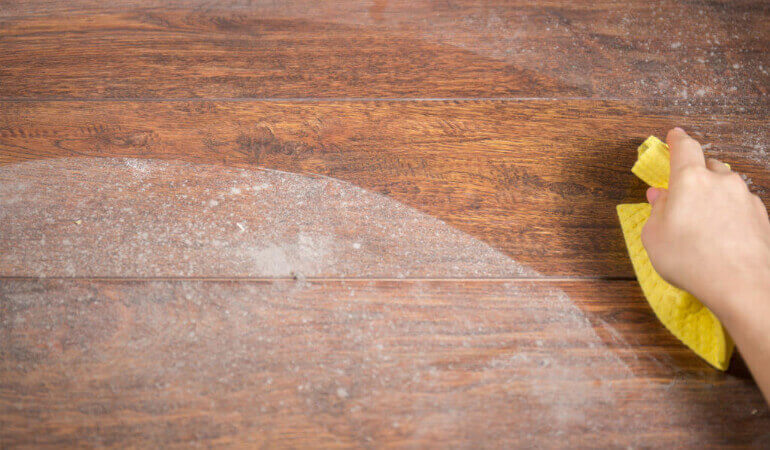

Guess how much we spend on cleaning products in the UK? £1 billion a year with sales soaring during spring cleaning time. But you don’t need commercial cleaning products to clean everything in your kitchen.
Remove cooking odours
Have you burnt something or is there a lingering smell of fish or curry in your kitchen? Boil a cup of distilled white vinegar and a couple of cloves in an uncovered saucepan for a few minutes. Unwanted cooking smells will be banished.
Have sparkling saucepans again
Burnt on stains from pans are easily removed with cheap own brand cola. Just pour the cola into the pan to cover the burnt area. Boil, stir, remove from heat and pour away. The burnt residue should be removed. Then rinse and wipe clean.
Remove kettle limescale
Place large chunks of lemon in the kettle then fill with water and boil. Leave the mixture overnight and the next morning discard the lemons and water, rinse thoroughly. Your kettle should be limescale free.
Clean a microwave
Is the inside of your microwave full of food deposits? Mix half a cup of lemon juice and a cup of boiling water in a bowl and place in microwave. Set the microwave to ‘cook’ for 30 seconds on high setting. Carefully remove the hot bowl, now you can easily wipe the inside of the microwave using a damp cloth.
Remove burned on grime on a glass oven door
Using a bicarbonate of soda with a tiny amount of water mix a thick paste. Wearing rubber gloves, rub the paste on the inside of the door using a cloth. Leave for 15 minutes and then wash the paste off. The paste works wonders on burned on food on a hob too.
Get rid of smells in a fridge
Cut a lemon in half and scoop out the flesh, fill one empty lemon shell with salt and place in a back corner of the fridge. You’ll get an effective, cheap but natural deodoriser. Another option is to put potato peels in the fridge. Or soak a cotton ball in vanilla extract and place in a small bowl which you then place in the fridge.
Get rid of smells from a sink
Pour half a cup of bicarbonate of soda down the drain, followed by one or two cups of white vinegar. Leave for 10 minutes, rinse with boiling water.
Make kitchen tiles look like new
Sprinkle baking soda over your kitchen tiles. Fill a spray bottle with vinegar and spray it over the baking soda. The mixture will fizzle so leave it working for a few minutes. Use old toothbrush to scrub the tiles and the grout. Wipe with soapy water using microfibre cloth. Your kitchen tiles will look like new.
Clean your kitchen sponge
If you don’t want to throw away your kitchen sponge every week then there’s a cleaning hack you can try to keep them bacteria-free. Put a glass of water in the microwave and lay the sponge next to it, microwave for a few minutes. This will remove the oils and dirt and kill the bacteria. Another option is to put the kitchen sponge in the dishwasher every time you wash other dishes on long cycle. This will also remove any smells from the sponge.
Keep your bins smelling fresh
Soak a cotton ball in your favourite essential oil and place it in the bin underneath the bin liner.
Polish your stainless steel sink
To get your stainless steel sink sparkling again then after washing it and drying it sprinkle it with flour and buff.
Make your dishes sparkle when using a dishwasher in hard water area
Those of us living in an area with hard water can get frustrated with dishes looking dirty after being in the dishwasher. There’s a cleaning hack for that too. Place a bowl filled with vinegar on the top rack of the dishwasher and then run as usual.
Remove tea and coffee stains from your favourite cups
Sprinkle the stains with baking soda and add just enough water to form a paste, then scrub the stains away and wash as usual.
Keep the tops of your kitchen cabinets clean
Line the surface with sheets of wax paper or old newspapers which is more eco-friendly option. If using wax paper, the wax will collect dust and grime. All you have to do then is change the sheets couple of times a year.
Use your dishwasher to clean more than just dishes
You can clean lot more than dishes in your dishwasher. Dishwashers are a great way to deep clean plastic toys, sponges, hairbrushes or flip flops.
Clean stained and smelly wooden chopping boards
Although wooden chopping boards can’t be washed in the dishwasher they can be washed using lemon. Cut a lemon in half and use the halve one to clean the surface. Sprinkle with salt or bicarbonate of soda and clean with lemon halve for more stubborn stains.
Remove stains from wooden worktops
You can use vinegar and lemon to remove stains or the combination of salt and lemon when cleaning wooden chopping boards. Don’t forget to re-oil wooden worktops at least 4 times a year to keep them in a good condition and looking like new.
Clean dirty gas burners
Pput the gas burners in a sealable plastic bag and add 4 tbsp of ammonia then seal the bag, leave overnight, clean under running warm water then clean in a hot soapy water, rinse and dry.
Clean your dishwasher fast
Place 250ml of white vinegar in a dishwasher safe cup of bowl and place on the top rack. Run on hot, full cycle. The vinegar will disinfect your dishwasher, wash away grease and grime and remove odours.
Clean out kitchen cabinets in minutes
Instead of picking up crumbs with a cloth why not use your vacuum to clean out kitchen cabinets. Use the brush attachment to vacuum crumbs within minutes.
Make your own citrus all-purpose cleaner
Get a large mason jar and start filling it with citrus peels – lemons, limes, grapefruit or oranges. When the jar is half full cover the citrus peels with vinegar then cover the jar with a lid and leave it for 2 weeks. After 2 weeks, use a sieve to strain the mixture into a bowl. Pour the mixture into a spray bottle and you have your very own eco-friendly citrus all-purpose cleaner.


